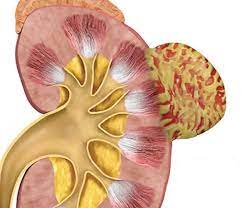Angiomyolipoma – AML
What is it:
- Angiomyolipoma (AML) is a benign tumor, most commonly found in the kidney.
- Composed of fat, muscle and blood vessels.
- It is often discovered incidentally and is usually asymptomatic,
- Can cause pain, anemia, fever, or high blood pressure if it grows large enough.
- Not dangerous but large or specific types, like the epithelioid variant, can carry a risk of life-threatening bleeding, which may require treatment such as surgery or embolization.
Symptoms:
- Most people have no symptoms.
- If the tumor grows large, symptoms can include:
- Pain in the flank area
- Anemia
- Fever
- High blood pressure
- Blood in the urine
- Rarely, internal bleeding, which is a medical emergency
Diagnosis:
- Often found incidentally on imaging tests (like a CT scan) performed for other reasons.
- CT scans are very effective at identifying the fat content that is characteristic of most AMLs.
- Other imaging, such as ultrasound or MRI, can also be used.
Treatment:
- Many small, asymptomatic AMLs may not need treatment and are simply monitored.
- Treatment options include:
- Embolization: Sealing off the blood vessels within the tumor to reduce the risk of bleeding. This is often suggested for tumors 4 cm or larger.
- Surgery: To remove the tumor.
- Medication: Drugs like everolimus can be used to block cell growth pathways, especially for large or symptomatic tumors, including those associated with tuberous sclerosis
The decision for treatment depends on the tumor’s size, symptoms, and type.


Leave a Reply
Want to join the discussion?Feel free to contribute!